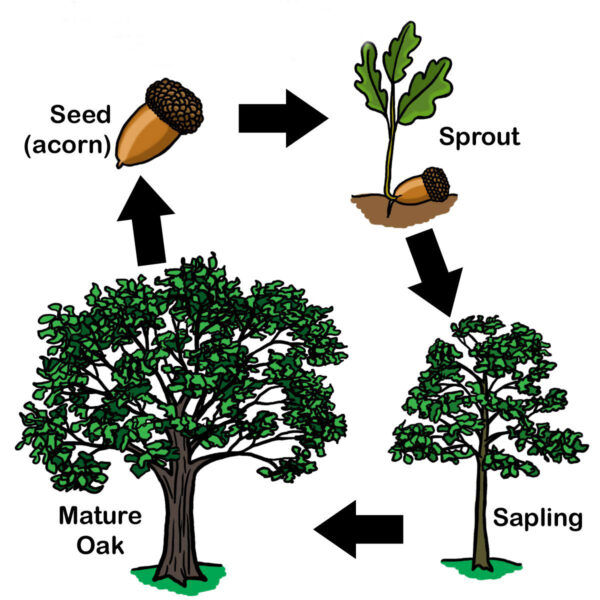
The Joy of Enduring to the End
Our Journey Starts Small But Ends Big
It is so easy in this present evil generation to become depressed by the evils of this world. All around us we see the trappings of a civilization that is caught up in sin and depravity that exceeds what we thought yesterday was impossible. Yet, the degree to which society degenerates seems to compound week by week. True to the words of Paul to Timothy,
“But know this, that in the latter days perilous times will come: for men will be lovers of themselves, lovers of money, boasters, proud, blasphemers, disobedient to parents, unthankful, unholy, unloving, unforgiving, slanderers, without self-control, brutal, despisers of good, traitors, headstrong, haughty, lovers of pleasure rather than lovers of God, having a form of godliness but denying its power” (II Timothy 3:1-5).
These traits certainly describe today, and for this reason — among many other reasons — we appear to be in the end time shortly before the return of Jesus Christ. We read in Job a most interesting and encouraging verse that is meant for all of us.
“Though your beginning was small, yet your latter end would increase abundantly” (Job 8:7).
Though these words were spoken by Bildad the Shuhite, yet they are recorded for our encouragement even today. Let us take a close look at the implications of this inertesting verse and see where it leads us, and gain insight and wisdom into the Eternal’s mind.
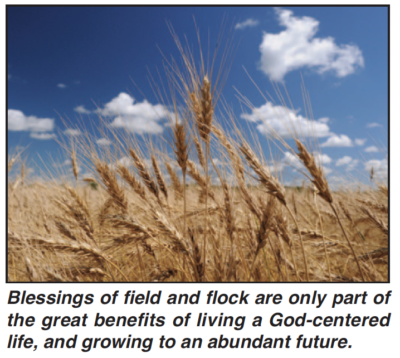
The Righteous Will Prosper
We are given unequivocal assurance that God’s people will prosper. Take a look at the many Scriptures that give us this promise.
Deuteronomy 28:1-6. “Now it shall come to pass, if you diligently obey the voice of the Lord your God, to observe carefully all His commandments which I command you today, that the Lord your God will set you high above all nations of the earth. And all these blessings shall come upon you and overtake you, because you obey the voice of the Lord your God: Blessed shall you be in the city, and blessed shall you be in the country. Blessed shall be the fruit of your body, the produce of your ground and the increase of your herds, the increase of your cattle and the offspring of your flocks. Blessed shall be your basket and your kneading bowl. Blessed shall you be when you come in, and blessed shall you be when you go out.”
Deuteronomy 30:5, 9. “Then the Lord your God will bring you to the land which your fathers possessed, and you shall possess it. He will prosper you and multiply you more than your fathers. And the Lord your God will circumcise your heart and the heart of your descendants, to love the Lord your God with all your heart and with all your soul, that you may live”
Deuteronomy 8:18. “You shall remember the Lord your God, for it is He who gives you power to get wealth, that He may establish His covenant which He swore to your fathers, as it is this day.”
power = koach, “to be firm, vigor, force, capacity, means.”
wealth = chayil, “a force, such as means or other resources, power, riches, strength, substance; from chuwl, “to twist, whirl, dance, writhe (as in birth).”
Joshua 1:8. “This Book of the law shall not depart from your mouth, but you shall meditate in it day and night, that you may observe to do according to all that is written in it. For then you will make your way properous, and then you will have good success.”
prosperous = tsalach, to push forward, in various senses.”
Job 36:11. “If they obey and serve Him, they shall spend their days in prosperity, and their years in pleasures.”
prosperity = towb, “to be or make good in the widest sense.”
pleasures = nayim, “delightful.”
Psalm 1:3. “He [the one who delights in God’s law and meditates upon it: verse 2] shall be like a tree planted by the rivers of water, that brings forth its fruit in its season, whose leaf shall not wither, and whatever he does shall prosper [tsalach].”
Psalm 25:12-13. “Who is the man that fears the Lord? Him shall He teach in the way He chooses. He himself shall dwell in prosperity [towb], and his descendants shall inherit the earth”.
Proverbs 10:22. “The blessing of the Lord makes one rich, and He adds no sorrow with it.”
rich = dashen, “to be fat, or fatten, to anoint, to satisfy”
Proverbs 13:4 “The soul of a lazy man desires, and has nothing, but the soul of the diligent shall be made rich [dashen].”
Proverbs 22:4. “By humility and the fear of the Lord are riches and honor and life.”
Malachi 3:10. “Bring all the tithe into the storehouse, that there may be food in My house, and try Me now in this, says the Lord of hosts, if I will not open for you the windows of heaven and pour out for you such blessing that there will not be room enough to receive it.”
Matthew 6:33. “But seek first the kingdom of God and His righteousness, and all these things shall be added to you.” These “things” are food, drink, and clothing (verse 31).

This prosperity and wealth of the righteous is shown in these Scriptures to not refer primarily to an abundance of physical wealth — land, houses, gold, silver, and other material things — but rather to enough to supply one’s sustenance. After all, the Apostle Paul told Timothy, “And having food and clothing, with these we shall be content” (I Timothy 6:8; see also Hebrews 13:5). Moreover, prosperity and wealth refer to goodness and plenty of one’s entire existence, not just in material things, though it can refer to physical wealth. For example, Abraham, the father of the faithful (Galatians 3:7), was very rich in gold, silver, and cattle (Genesis 13:2), and Job likewise possessed abundant riches of flocks and herds (Job1:3; 42:12).
It is also apparent that the wicked can wax rich. Job related how the wicked can live to a ripe old age, gain great power, have large families, and amass great wealth (Job 21:7-13). Yet, in a moment they die and are gone. The physical prosperity of evil men is revealed in many places: Job 24:1-12, 22-24; Psalm 73:3, 13; 37:7; Lamentations 1:5; Daniel 8:24; 11:36; Jeremiah 12:1-2; Malachi 3:15. Their fate, however, is utterly without a future hope. Their lives are ultimately washed away when the floods come and wash away their houses built upon sand (Matthew 7:26-27).
Prosperity Requires Effort!
God’s word is clear concerning the attainment of prosperity. Much work is required by the elect to achieve prosperity of mind, body, and spirit, and we know that “Faith without works is dead” (James 2:20). This is certainly the implication of II Corinthians 9:6-8.
“But this I say: he who sows sparingly will also reap sparingly, and he who sows bountifully will also reap bountifully. So let each one give as he purposes in his heart, not grudgingly or of necessity; for God loves a cheerful giver. And God is able to make all grace abound toward you, that you always having all sufficiency in all things, may have an abundance for every good work.”
Note especially the phrase, “that you always having all sufficiency in all things, may have an abundance for every good work.” Is this not saying that the abundance [perisseuo, “superabound, be superfluous, excel”] we achieve will result from sowing bountifully? Note the following Scriptures.
Proverbs 10:4. “He who has a slack hand becomes poor, but the hand of the diligent makes rich.”
diligent = charuwts, “decision, diligent, determination, eagerness.”
Proverbs 12:24. The hand of the diligent shall bear rule, but the slothful shall be under tribute.”
slothful = rmiuah, “remissness, treachery, slack.”
Proverbs 21:5. “The thoughts of the diligent [charuwts] tend only to plenteousness, but of every one that is hasty only to want.”
hasty = uwts, “to press, to be close, or hurry.”
Ecclesiastes 9:10. “Whatever your hand finds to do, do it with your might; for there is no work or device or knowledge or wisdom in the grave where you are going.”
Luke 6:38. “Give, and it will be given to you; good measure, pressed down, shaken together, and running over will be put into your bosom. for with the same measure that you use, it will be measured back to you.”

What an incredible encouragement and guarantee our Creator gives us, that if we are diligent in our efforts we will be rewarded for those efforts … “For with the same measure that you use, it will be measured back to you.” This is not saying we should do good works, pass proper judgment, and keep the Eternal’s commandments with the underlying objective to be personally blessed, but we must do these things beaume they glorify our Father who is in heaven. We are instructed by Jesus Christ as follows.
Matthew 6:3-4 “But when you do a charitable deed, do not let your left hand know what your right hand is doing, that your charitable deed may be in secret; and your Father who sees in secret will Himself reward you openly.”
Luke 14:12-14. Then He also said to him who visited Him, ‘When you give a dinner or supper, do not ask your friends, your brothers, your relatives, nor rich neighbors, lest they also invite you back, and you be repaid. But when you give a feast, invite the poor, the maimed, the lame, the blind. And you will be blessed, because they cannot repay you; for you shall be repaid at the resurrection of the just’”
Luke 6:30. “Give to everyone who asks of you. And from him who takes away your goods do not ask them back.”

We Start Small, But End Big
It is a law of God’s universe, it appears, that good things start small but end up being big. There are plenty of examples of this wisdom from our heavenly Father, throughout Biblical history a well as in the modern age. Let us first take a look at some recent examples … and these examples apply to both physical and spiritual riches.
Dale Carnegie. One day Dale Carnegie prepared a short talk entitled, “How to win friends and influence people.” This talk was repeated many times, but soon expanded to consume 1.5 hours. After giving his talk for some time he found that attendees began discussing their experiences, and some “rules” began to take shape. Eventually the talk became a course, and then there was the need for a textbook of sorts. In Carnegie’s own words,
“We started with a set of rules printed on a card no larger than a postcard. The next season we printed a larger card, then a leaflet, then a series of booklets, each one expanding in size and scope. After fifteen years of experimentation and research came this book [How to Win Friends and Influence People”].
From a short talk came, in the course of years, a book outlining how to favorably impact people. The book has sold over 15 million copies.
Apple Computers. It’s one of the most valuable brands today, so it’s often surprising when people learn that Apple’s first computers were built in a small garage in Cupertino, California. In 1976, Steve Wozniak created the first Apple computer. He then joined forces with the late Steve Jobs and another partner, Ronald Wayne, to launch Apple Computer Company from Jobs’ adopted parents’ garage. One of their first big orders was from a local retailer who ordered 50 computers at $500 apiece, which they were able to produce in just 30 days. Today, Apple is a household name, and millions of people, including yours truly, own them. The small beginning became very large in the course of time.
Hewlett-Packard. Just 10 miles from the garage where Apple was started, Stanford graduates Bill Hewlett and Dave Packard launched their own company, Hewlett-Packard (HP), in 1939 with an investment of just $538. In the 12 by 18 foot garage in back of the house they were renting, Hewlett and Packard built their first product: an audio oscillator. One of their first customers was Walt Disney Productions, which bought eight audio oscillators to use for certifying the surround sound systems installed in theaters for the film Fantasia. The garage was used as a research lab, development workshop, and manufacturing facility for nearly a year before the partners outgrew it and moved to roomier quarters nearby. The company was incorporated in 1947 and, 10 years after that, became a public company. Today, HP is a huge company specializing in computer products. What began small ended up very big.
Amazon. Four years after being named the youngest vice president of a successful Wall Street investment firm, Jeff Bezos quit his job and moved to Seattle to pursue what he believed to be untapped online retailing opportunities in the book industry. He set up shop in his garage in Bellevue, Washington, and began developing software. Because he couldn’t have meetings in a garage with a potbellied stove, Bezos held meetings at a nearby Barnes & Noble store, where most of Amazon’s first contracts were negotiated. In July of 1995, Bezos launched Amazon.com and sold his first book from his garage startup. Two years after that Bezos issued his IPO. The company is the world’s largest online retailer. A small start ended up being a very big enterprise.
Now let us examine some Biblical examples.
Joseph, the son of Jacob. Sold to Ishmaelite traders by his jealous brothers, Joseph was purchased by Potiphar, servant to the Pharaoh of Egypt. From a traded commodity, Joseph soon gained notoriety in Potiphar’s household as a trusted, reliable, moral servant, even after thrown into the king’s prison for being falsely accused of attempted rape. Even in prison Joseph was given responsiblities due to his stellar character, and ultimately, on his release and interpretation of the Pharaoh’s dreams, was made second in command to Pharoah himself (See Genesis 37 and 39-47).
Israel. Beginning with a family of 70 that moved from Canaan to Egypt (Genesis 46:27), the people of Israel have grown into a number of Anglo-Saxon nations that number into the millions, including the United States, Canada, Argentia, Australia, New Zealand, and other nations in Europe and Scandinavia. Truly, the descendants of Jacob have become numerous as the sand of the seashore and the stars of heaven (Genesis 32:12). What began very small has became very big.
Mankind as a whole. In Elohim’s plan to repopulate the earth, He made man in His own image, to have dominion over the fish, birds, cattle, and everything else on the earth. Then He said, “Be fruitful and multiply; fill the earth and subdue it” (Genesis 1:27-28). In the process of time, these original parents reproduced abundantly, as commanded, and by the time of the Great Flood probably had multiplied to several billion people. Then the flood came and wiped away all but eight people, who survived on the ark, after which Noah and his family were given the same instructions as Adam and Eve had been given: “Be fruitful and multiply, and fill the earth” (Genesis 91). That leads us to the present time, when over seven billion people grace the face of the earth. What began small ended up big.
Job. This man had amassed mighty wealth by an early age, possibly because of an inheritance from his father. He possessed 7,000 sheep, 3,000 camels, 500 yoke of oxen, 500 female donkeys, a very large household to care for his substance, and seven sons and three daughters (Job 1:1-3). Yet, he lost everything he had due to various calamities that Satan was allowed to bring upon him. After this upright man learned his lessons from the Creator — “I have heard of You by the hearing of the ear, but now my eye sees You” (Job 42:5) — he was rewarded in the course of time with double the wealth he had before. Besides, he was given seven sons and three daughters once again (Job 42:12-13). What began with much, which was reduced to nothing, in the passage of time became great … a good lesson in itself for recovering after a fall.
Proverbs 24:16. “For a righteous man may fall seven times, and rise again, but the wicked shall fall by calamity.”
Psalm 37:23-24. “The steps of a good man are ordered by the Lord, and He delights in his way. Though he fall, he shall not be utterly cast down, for the Lord upholds him with his hand.” (See also Job 5:19; Psalm 34:19; Micah 7:8).
The ecclesia and the Kingdom. The true ecclesia, the elect, those called out of this world to be the kings and priests of the coming age, was never to be a large group, even as Christ said, “Do not fear, little [mikros, “small in number”] flock, for it is your Father’s good pleasure to give you the kingdom” (Luke 12:32). He added in Mathew 7:14, “Because narrow is the gate and difficult is the way which leads to life, and there are few [oligos, “puny in number”] who find it.” Yet, eventually the vast majority of His imagers will be called, chosen, and translated into the eternal spirit realm (the second resurrection: Revelation 20:11-15). Thus, what began as a very small number of saints will end up including most of the people who have ever lived; the Eternal Creator wills that none be lost (Romans 11:26; I Timothy 2:4). Speaking of the people populating all nations of the earth, Daniel relates in Daniel 2:35,
“Then the iron, the clay, the bronze, the silver, and the gold were crushed together, and became like chaff from the summer threshing floors; the wind carried them away so that no trace of them was found. And the stone that struck the image became a great mountain and filled the whole earth.”
What started very small became very great … with people from all nations finally fulfilling their destiny as creations in God’s image: kings and priests reigning on the earth (Revelation 5:10). What began as a spiritual nation scattered among mankind throughout all nations of the earth will finally be one world filled only with God’s people.
I Corinthians 15:28. “Now when all things are made subject to Him, then the Son Himself will also be subject to Him who put all things under Him, that God may be all in all.”

The post-resurrection ecclesia. When Jesus began his three-year ministry, He drew massive crowds because of healings and casting out of demons, together with His preaching about the coming Kingdom of God. The miraculous healings excited their interest so they might listen to the main messages He spoke. Yet, out of the thousands of people attracted to His teachings and messages only a few remained with Him as the end of His ministry approached. “From that time on many of His disciples turned back and no longer walked with Him” (John 6:66). Even the 12 apostles deserted Him the night before His crucifixion (Matthew 26:56).
We have a record that Christ appeared to more than 500 brethren afer the crucifixion — not many considering the great number that had interacted with Him during the previous three years — and it was not until the Day of Pentecost that about 3,000 brethren were baptized (Acts 2:41). More were added to the ecclesia thereafter since the door was opened for gentiles as well. The number of elect grew rapidly, and some references say there were 1 million Sabbath-keeping Christians in the Roman Empire by 100 A.D., out of a population of 181 million (www2.andrews.edu). Through the next centuries up to the present the number of true elect is impossible to ascertain. We can see a steady accumulation of numbers in the ecclesia, though a number very small compared to the unconverted populations of all countries, likely less than 1%. Even so, from very small beginnings the ecclesia has grown greatly.
Plants. Starting with a small seed, plants grow to various sizes depending on their genetics and environmental setting. Some plant grow faster than others, but a typical tree, though inches tall the first year, might reach hundreds of feet in height, as do giant sequoias. The Parable of the Mustard Seed emphasizes this point: from a tiny seed grows a large annual plant in which birds can nest (Matthew 13:31-32; Mark 4:30-32).
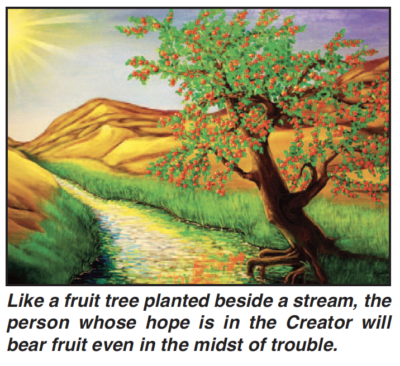
The Journey from Obscurity to Greatness
Big things almost always start small. This law is nowhere more apparent than the Creator’s promises towards the elect. Note what Jeremiah wrote concerning the servant of Yahweh who trusts in Him.
Jeremiah 17:7-8. “Blessed is the man who trusts in the Lord, and whose hope is in the Lord. For he shall be like a tree planted by the waters, which spreads out its roots by the river, and will not fear when heat comes, but its leaf will be green and will not be anxious in the year of drought, nor will cease from yielding fruit.”
A fruit tree by a river begins with a small seed. The seed sprouts and grows into a sapling, its roots reaching out to the water of the river, which will always provide essential moisture even in times of drought. It can grow into a massive tree over decades, providing fruit year after year … like the servant of the Eternal, drinking in of the spirit through the living waters poured out from the Father’s bosom (John 7:37-38; Isaiah 55:1), blossoming and bearing fruit in due season (Galatians 5:22-23), not anxious even though society around him may experience a drought of God’s word and spiritual depth (Romans 8:35; II Timothy 1:7).
Jeremiah 29:11. “For I know the thoughts that I think toward you, says the Lord, thoughts of peace and not of evil, to give you a future and a hope.”
When times are hard and one is bereft of substance and prospect for a future, God will step in and provide a future and a hope. That new life starts small.
Job 8:7. “Though your beginning was small, yet your latter end would increase abundantly.”
Proverbs 28:20. “A faithful man will abound with blessings, but he who hastens to be rich will not go unpunished.”
The message of Soloman is to grow rich slowly, from a small beginning. Those types of riches will last and prosper the person.
Proverbs 20:21. “An inheritance gained hastily at the beginning will not be blessed at the end.”
inheritance = nachalah, “possession, prosperity, or inheritance.”
Proverbs 28:20. A faithful man wil abound with blessings, but he who hastens to be rich will not go unpunished.”
hastens = uwts, “to press, hurry.”
unpunished = naqah, “to be pure or innocent.”
Proverbs 4:18. “But the path of the just [taddiyq, “righteous, just”] is like the shining sun, that shines even brighter unto the prefect day.”
The righteous person starts small, increasing in his righteous character by becoming more and more perfect as time passes (Matthew 5:48), like a star that shines brighter as the years pass.
Psalm 68:6. “God sets the solitary in families; He brings out those who are bound [aciyr, “captive”] into prosperity; but the rebellious dwell in a dry land.”
The captive person, whether a prisoner or slave, can be delivered from such a bound state, beginning life anew with little to his name, and then increase steadily as he is blessed by the Eternal. Remember the life of Joseph as well, who was sold as a slave, and in prison for two year, but eventually released to become second in power to the pharaoh of Egypt. He increased in power and stature as God led him over many years. Likewise, Job, upon healing from boils, received double what he had before; this return to wealth presumably occurred over a period of many years, accumulating slowly, since he lived 140 years after his ordeal.
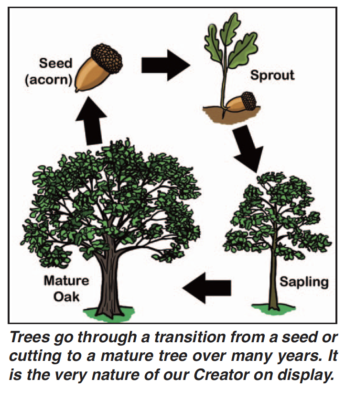
God’s Way Is Increase!
This “law” of starting small and growing large that we find all throughout the creation is a consequence of the very nature of the Creator Himself. We have seen examples on both the physical and spiritual planes, and it is the means by which a small and insignificant beginning can result in a great and noteworthy ending!
Physical increase
Growth of plants from seeds to magnificent trees
Growth of humans and animals, birds and fish and reptiles from a single cell to a full-grown adult
Growth of small families to entire nations
Growth of businesses from humble beginnings to large enterprises
Spiritual increase
Growth of the ecclesia to eventually encompass all of mankind
Growth of the fruits of God’s spirit to over time replace the fruits of the flesh in God’s people
“Of the increase of His government and peace there will be no end” (Isaiah 9:7).
Our Obscurity Will Be Erased!
The knowledge of small beginnings leading to great ends should be of great encouragement to all of us. This world of Satanic influence (II Corinthians 4:4; Ephesians 2:2), in which virtually every phase of life has been perverted by the Adversary (Revelation 12:9), can become very depressing and disheartening to us. This is what the evil one wants: to discourage us who keep the pure laws of love of God and love of neighbor, and attempt to mold even us, the elect, into his carnal, lustful, perverted ways of living. The modern-day eruption of sexual perversion, marital discord, abortion, pornography, disrespect towards parents and authorities, theft, filthy speech, and murder (see II Timothy 3:1-5) can easily dispirit any of us.
Yet, the indwelling spirit of God grants us the ability to resist this discouragement, for we know what our future is: eternal spirit life with the Father and Christ, alongside our brethren called out of this world of sin ever since Adam. Though downtrodden and despised by the world, looked upon as the least of God’s creations by the world, God is building the character within us that He will amplify to incredible heights. See what the Apostle Paul had to endure.
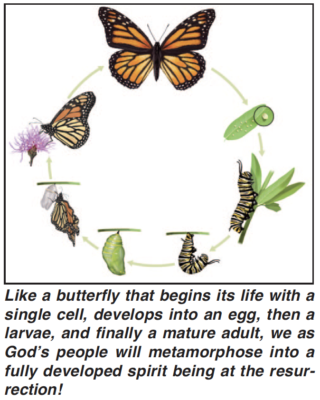
II Corinthians 11:23-27. “Are they ministers of Christ? — I speak as a fool — I am more: in labors more abundant, in stripes above measure, in prisons more frequently, in deaths often. From the Jews five times I received forty stripes minus one. Three times I was beaten with rods; once I was stoned; three times I was shipwrecked; a night and a day I have been in the deep; in journeys often, in perils of waters, in perils of robbers, in perils of my own countrymen, in perils of the Gentile, in perils in the city, in perils in the wilderness, in perils in the sea, in perils among false brethren; in weariness and toil, in sleeplessness often, in hunger and thirst, in fastings often, in cold and nakedness ….”
Paul further emphasized that he was “… less than the least of the saints …” (Ephesians 3:8), and “… the least of the apostles …” (I Corinthians 15:9), since he persecuted the ecclesia before his calling. In his decreptitude he nevertheless stated near the time of his execution that he had fought the good fight, had finished the race, had kept the faith, and as a result “… there is laid up for me a crown of righteousnesses …” that the Eternal will give him — and all of the saints — at the resurrection (II Timothy 4:6-8). Paul knew that he, the least of the disciples, yet with his small beginning would end up at the resurrection a glorious super-being!
The same applies to each of us.Beginning as the least of all people — surely so in the sight of the world — we will be raised at the return of Jesus Christ to be eternal spirit beings, unable to sin, shining as the sun in it brightness (I Corinthians 15:51-52; I John 3:9; Matthew 13:43).
- The least will be greatest (Matthew 23:11-12; Luke 9:48).
- The last will be first (Matthew 19:30; 20:16; Mark 9:35; Luke 13:30).
We will have begun small, among the offscourings of the earth, at our calling (I Corinthians 4:13), but once raised we will be incredibly powerful but loving, eternal spirits. From a lowly slave of men to a brilliant spirit of Elohim, we will have achieved the purpose for which we were born: brothers of Christ, sons of our heavenly Father, and reigning with Him forever and ever. From obscurity to magnificence we will have emerged from our fleshly cocoon to be a glorious, multi-colored butterfly, as it were.
In the meantime, let us help those in need through encouragement in fellowship, and in liberal giving to those in need from the excess we might have been blessed with.
Deuteronomy 15:10-11. “You shall surely give to him, and your heart should not be grieved when you give to him, because for this thing the Lord your God will bless you in all your works and in all to which you put your hand. For the poor will never cease from the land; therefore I command you, saying,’You shall open your hand wide to your brother, to your poor and your needy, in your land’”
Proverbs 22:9. “He who has a generous eye will be blessed, for he gives of his bread to the poor.”
James 1:27. “Pure and undefiled religion before God and the Father is this: to visit orphans and widows in their trouble, and to keep oneself unspotted from the world.”
We are now creations, made in the image of God and designed to glorify our Creator. Let us move forward toward that wonderful future for “… the prize of the upward call of God in Christ Jesus” (Philippians 3:13-14), endure to the end (Matthew 24:13), encourage one another along this difficult pathway we have been given to tread, and take Job 8:7 at face value:
“Though your beginning was small, yet your latter end would increase greatly.”

